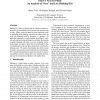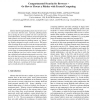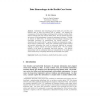9 search results - page 1 / 2 » Identity Theft - Empirical evidence from a Phishing Exercise |
USS
2008
13 years 7 months ago
2008
Phishing is a form of identity theft in which an attacker attempts to elicit confidential information from unsuspecting victims. While in the past there has been significant work ...
COMPSAC
2005
IEEE
13 years 10 months ago
2005
IEEE
Phishing is a form of online identity theft that aims to steal sensitive information such as online banking passwords and credit card information from users. Phishing scams have b...
IEEEARES
2007
IEEE
13 years 11 months ago
2007
IEEE
Identity theft through phishing attacks has become a major concern for Internet users. Typically, phishing attacks aim at luring the user to a faked web site to disclose personal ...
FC
2006
Springer
13 years 8 months ago
2006
Springer
Abstract. Phishing, or web spoofing, is a growing problem: the Anti-Phishing Working Group (APWG) received almost 14,000 unique phishing reports in August 2005, a 56% jump over the...
FC
2009
Springer
13 years 11 months ago
2009
Springer
Confidential data hemorrhaging from health-care providers pose financial risks to firms and medical risks to patients. We examine the consequences of data hemorrhages including pri...



